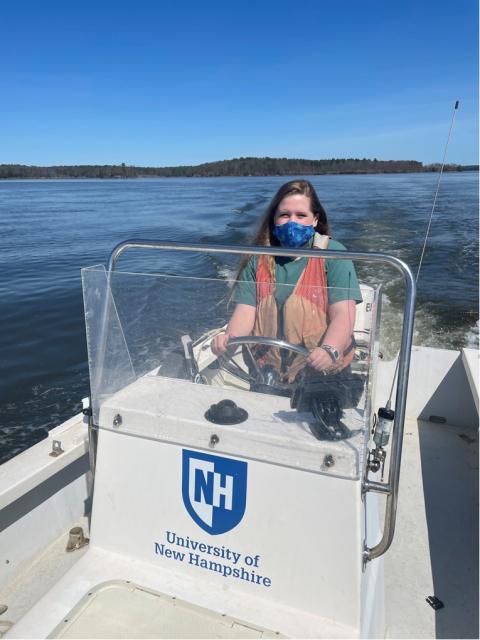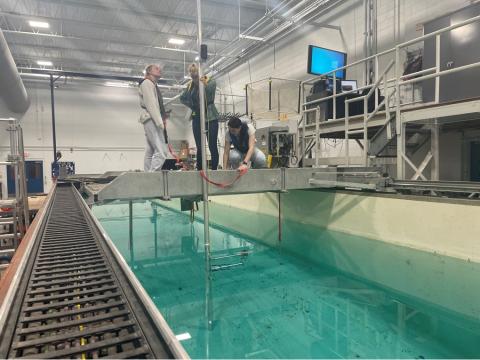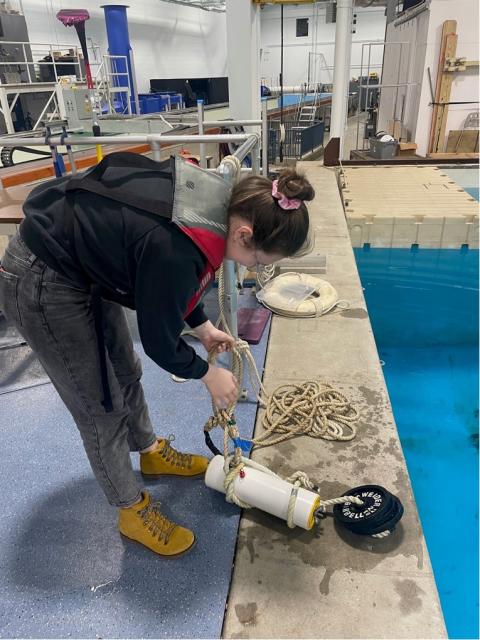What is Ocean Engineering?
Whether you’re planning your campus visit or starting to think about choosing majors, you’ll likely notice that UNH is an incredible place to live and learn if you’re interested in studying the ocean. UNH’s excellence in all-things marine means we offer an array of majors that immerse students in the future of our blue planet, from marine biology to ocean engineering. For Kelsea Carmichael ‘25, majoring in ocean engineering helped her combine her dual passions for marine biology and engineering – and play a major role in combatting the impacts of climate change on coastal communities.
But what is ocean engineering and why study it at UNH? Kelsea talks about her path – and invites you to explore campus through the eyes of an ocean engineering student.
What is ocean engineering?
To me, ocean engineering (OE) provides critical solutions to the countless challenges facing our planet and impacting our future. It’s at the forefront of green energy, sustainable aquaculture, ocean mapping and exploration. With it, we can save coastal communities from sea level rise or develop new technologies to observe deep sea creatures. When people ask me what OE is though, I like to say that we are just mechanical engineers with O-rings.

UNH ocean engineering student Kelsea Carmichael boats in the Great Bay at the Jackson Estuarine Laboratory five miles from campus.
Why I chose ocean engineering at UNH
When applying for college, I couldn’t choose between majoring in marine biology or engineering; my mom, a UNH alum, fixed this problem when she found UNH’s OE program. Seeing pictures of the smiling students on boats and reading through the course list, I got so excited.
However, being from South Carolina, I was scared to go so far from home, especially to a place with such a different culture and climate. I run on sweet tea and Waffle House, not Dunkin’, and I had never seen more than 3 inches of snow in my life. When I visited campus though, I felt in my heart that it was meant for me.
I toured the Jere A. Chase Ocean Engineering Laboratory (Chase). Not only did I meet some of the most passionate and kind professors I’ve ever met, but I got to see the nearly 360,000-gallon engineering tank and the 120 ft long wave tank both in use.

UNH students in the Innovation Scholars program work on a research project in the Jere A. Chase Ocean Engineering Laboratory.
Hands-on projects on day one
In the first semester as an ocean engineering major, you get to be in a seminar class in Chase. It allowed us to get to know the building, the professors, and the upper-class OEs. We learned how to code and wire temperature sensors, a vital tool in a world with rapidly warming oceans. We also heard presentations from all the professors in the department, developing a deeper understanding of the capabilities of OE. In the second semester, you take a class covering the basics of engineering, including how to use computer aided design (CAD) and data processing software. Labs for this class vary from CAD projects to essentially just throwing devices into the engineering tank and seeing what data you collect. Since our class was only about 12 kids, we had plenty of one-on-one time with the professor and became best friends with our classmates.

UNH ocean engineering major Anne Berg (and Kelsea’s roommate) prepares to test the waterproof seal on her research project.
Ocean engineering community
As an OE student, I spend a lot of time in Chase, and even more in the engineering library, located in Kingsbury Hall. Luckily, there are residence halls located adjacent to all the College of Engineering and Physical Sciences (CEPS) buildings. This means that my peers in class were often my neighbors in my residence hall, Handler, and my dining mates in Philbrook dining hall. This proximity creates a very strong community amongst CEPS students, which I love.
For example, my freshman year roommate was also an OE major. Most weekends, especially close to finals time, she and I would sleep in until about nine, go get breakfast at Philly, then go to Kingsbury to find a quiet nook to study in. Sometimes we worked on our OE projects together but sometimes we just sat together while doing other class work. We held each other accountable to get our work done but also reminded each other to take breaks and take care of ourselves. Those are the types of people who will become your family in UNH’s ocean engineering program: passionate, driven scholars with the biggest hearts out of anyone.
Take the next step:
Meet another ocean engineering major
Sign up for your campus visit
Learn about CEPS Innovation Scholars program
Discover Ocean Engineering in the Great Bay Estuary: